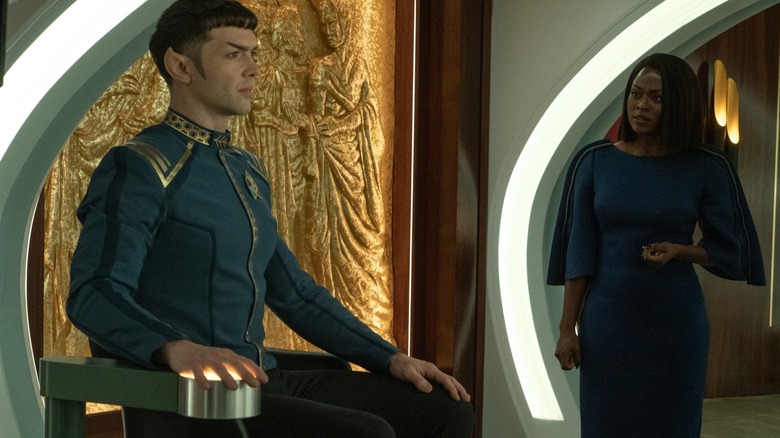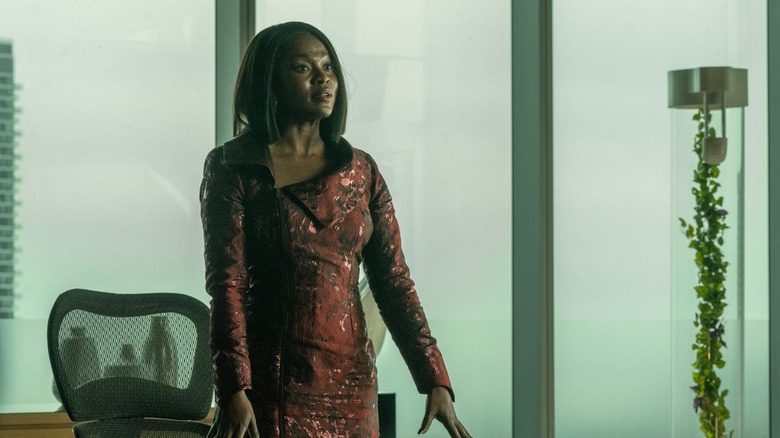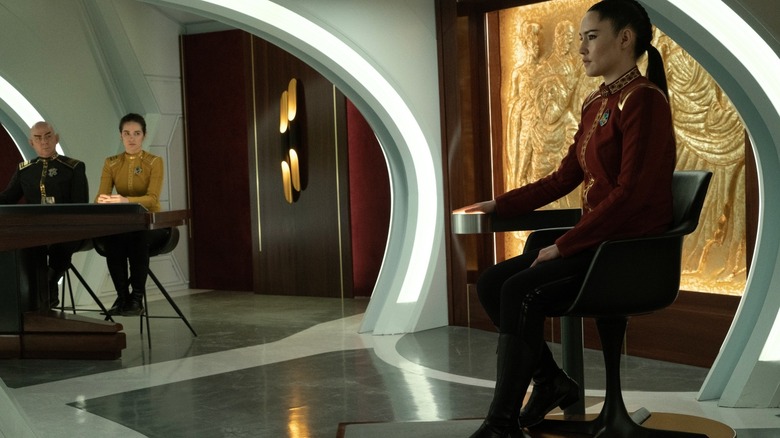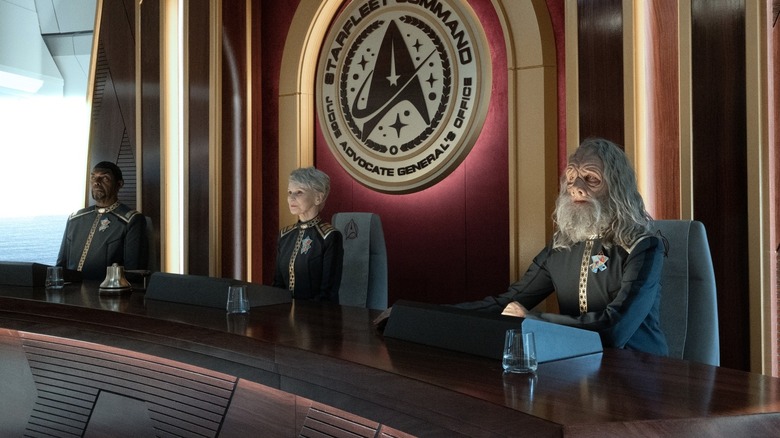Star Trek: Strange New Worlds Season 2 Episode 2 Puts Starfleet On Trial
The second episode of the second season of "Star Trek: Strange New Worlds," called "Ad Astra per Aspera," skillfully tackles a classical "Star Trek" ethical dilemma while wrapping up a stray plot point left over from the show's first season. Fans of "Worlds" might recall that Commander Una Chin-Riley (Rebecca Romijn) was arrested in the first season's final episode for lying about her species on her application to Starfleet Academy. It seems that she is not human, but an Illyrian, a species of genetically enhanced superbeings whose augmentations were long ago deemed illegal by the Federation. It will be in "Ad Astra" that Commander Chin-Riley will be put on trial.
Given the general "return to status quo" ethos of the "Worlds" episodic storytelling, it may come as no surprise that Commander Chin-Riley will likely be exonerated. The thrill will come in seeing what legal arguments are made. In this case, most of the more interesting points and speeches will come from a new character, Neera, an Illyrian lawyer played by Yetide Badaki.
While the writing is sharp and the legal machinations of Una's case are gripping from a thriller perspective, the most intriguing part of "As Astra" is the episode's willingness to put Starfleet itself on trial. In the timeline of "Star Trek," humans had to pass through a damning crucible of suffering in the form of several planet-devastating wars before they could reach the peaceful, tech-forward, peace-driven utopia as imagined by Gene Roddenberry. One of those wars was fought against genetically enhanced supermen (Khan among them). Because of the war, Earth strictly outlawed augmentation indefinitely. In so doing, however, Starfleet unwittingly created a new form of systemic prejudice.
The case for, the case against
The prosecutor in Una's case is Captain Batel (Melanie Scrofano) a would-be paramour of Captain Pike (Anson Mount). Because she is prosecuting his first officer, their relationship becomes temporarily strained. Pike travels to the Illyrian homeworld to ask for legal help — humans can't breathe Illyrian air, so he must wear a gas mask — and convinces Neera to help. Because Starfleet has long rejected genetically enhanced people like the Illyrians, Neera doesn't have a rosy view of the organization and agrees to take Una's case, if only to finally expose an unaddressed injustice in the Starfleet system.
"Star Trek" isn't always the best at calling out some of its more problematic writing tropes; it's rare that Starfleet is (often correctly) pointed to as an echo of old-world colonialism, with a United Federation of Planets enforcing a very specific ethic throughout the galaxy. One might point to the Prime Directive — the rule that forbids starships from interfering with the natural development of an alien culture — as a pointed anticolonialist measure, but the uniforms and images of military capability often outstrip that notion. So while "Star Trek" claims to take place in a world without prejudice, "As Astra" points out that there are still long-held prejudices baked into the system. It will take direct confrontation to weed them out.
This, of course, is in the spirit of Trek's more exhilarating themes of self-improvement. "Ad Astra per Aspera" finds a crack in Trek's own idealism, and then attempts to repair it with logic, legal action, and a confession that a mistake had been made. As previously stated in the pages of /Film, this series is Trek firing on all cylinders.
Fun throwbacks
Romijn is also finally given a moment to shine, particularly through several speeches about her childhood and her upbringing. Una reveals that, as an augmented person, she encountered bullying and hate from Federation citizens all the time, but still managed to look up at the stars and long for a career on a starship. She is the one who gets to drop the episode title and explain that it is a Latin phrase that translates to "to the stars through difficulties." She, like many on "Star Trek," is possessed of a specific Puritan work ethic that was once the guiding principle of Starfleet. What is "Star Trek" if not a workplace drama where characters get to iterate and litigate their principles?
But while "Strange New Worlds" is litigating its principles, however, it's still fun to watch. All of Una's fellow crewmates are called to the stand as character witnesses, and they are all relentlessly positive about Una and her capabilities as the first officer on board the U.S.S. Enterprise. "Strange New Worlds" gains a great deal of traction from its lightness and whimsy, and even finds moments of inter-office camaraderie, even during its more serious moments.
When Spock (Ethan Peck) is called to the stand, for instance, he reveals that Una Chin-Riley has a secret affinity for the musical stylings of Gilbert & Sullivan. This is, of course, a flashback to an episode of "Short Treks" episode "Q&A" (October 5, 2019) wherein Spock and Commander Chin-Riley were stuck on a turbo-lift together, and broke the tension by singing "The Major General Song" from "The Pirates of Penzance." The callback here is sweet and warm, even if "Q&A" was a little embarrassing at the time.
The fun nostalgia stuff
Additionally, Trekkies will likely receive a fun nostalgic thrill in seeing the "Worlds" characters in their legal fineries. In the original "Star Trek" series episode "Court Martial" (February 2, 1967), Captain Kirk (William Shatner) was court maritaled and had to appear before a tribunal in a formal uniform and wearing, perhaps curiously, a patterned brooch of some kind, presumably a collection of medals or commendations. To the modern eye, the brooch may look corny, but "Strange New Worlds" embraced it, pinning similar silly brooches on all the characters sitting in the courtroom. Thanks to modern costume design, they almost look natural.
Some might also like to see the new design on a species called the Tellarites, a hooved humanoid species that, in Trek lore, was one of the Federation's founding worlds. Because of the extensive makeup required to make a Tellarite, however, they have only been featured in a scant few episodes. Tellarites didn't appear on any of the 1990s Trek shows, and only showed up once or twice on "Star Trek: Enterprise." The first extensive appearance of a Tellarite was the character Jankom Pog (Jason Mantzoukas) on the animated series "Star Trek: Prodigy." This is the first live-action close-up we've had on a Tellarite for many years.
They look pretty cool.
The best word to describe "Ad Astra per Aspera" is "solid." It's also functional. Commander Una Chin-Riley can now rejoin the Enterprise crew and they can get on with their mission.



